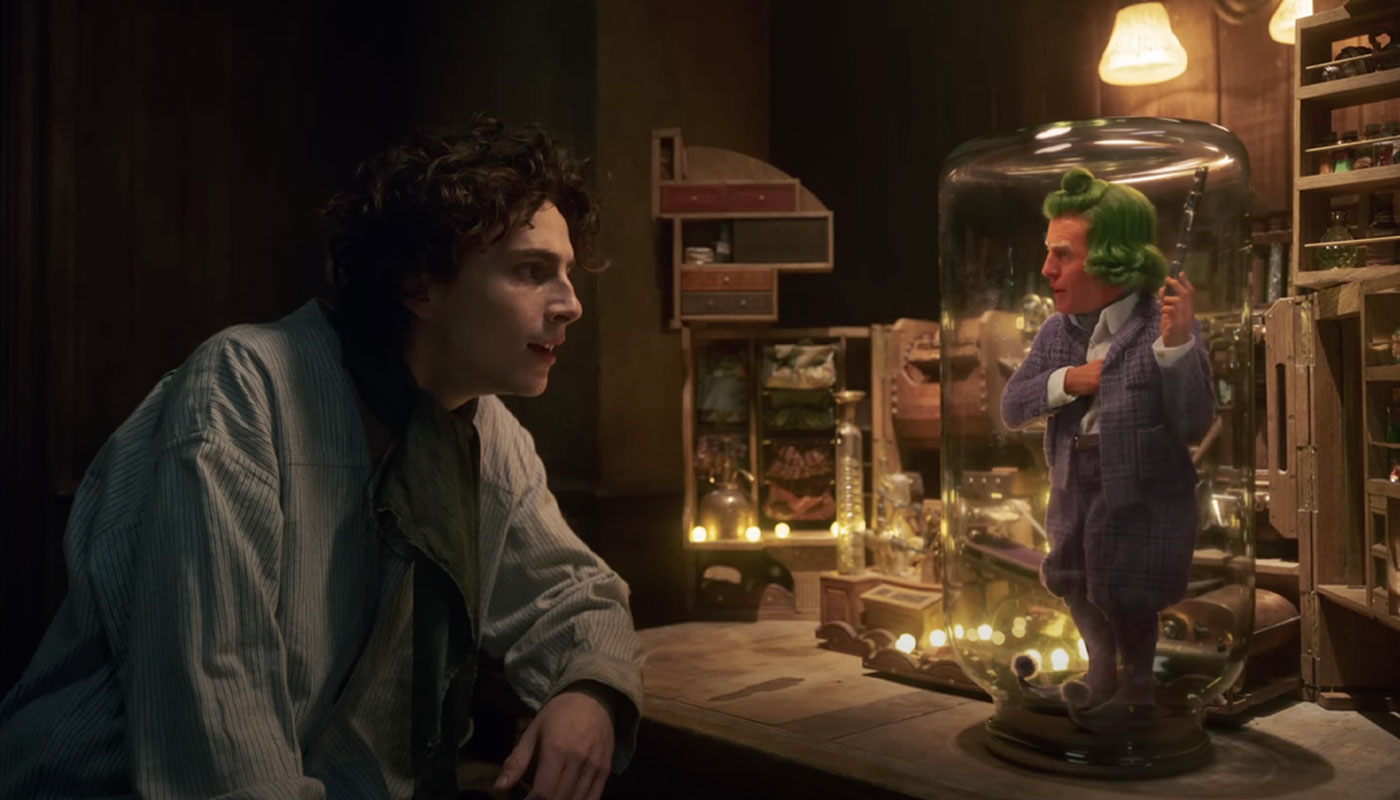Happy Disability Pride Month! Just in time, the trailer for the upcoming “Wonka” movie went live and a series of photos were leaked from the set of the “Snow White” live-action remake. People – myself, a little person, among them – have some thoughts.
Let’s start with the recently released trailer for “Wonka,” which stars Timothée Chalamet as the titular candy man and Hugh Grant as…an Oompa Loompa. Yes, you read that correctly. Hugh Grant is playing an Oompa Loompa. How does that work, you might wonder? Have the filmmakers taken the dramatic license to decide that the character doesn’t have to be a person of short stature? Will Grant play the character on his knees à la John Leguizamo as Toulouse Lautrec — a historical little person — in “Moulin Rouge?” No to both. Instead, the creative team decided to use CGI to transform Hugh’s body so that it appears to be of short stature.
This is problematic on so many levels. But before we delve deeper, let’s make a couple of things clear: The accepted terms to refer to someone with dwarfism are “dwarf” and “little person.” “Dwarf” is not a bad word. The “m”-word, on the other hand, is a derogatory slur that is not accepted, nor is the dwarfism community interested in reclaiming it. Moreover, the plural form of “dwarf” is “dwarfs.” “Dwarves” is a term that was made popular by author J.R.R. Tolkien and refers to fantastical characters not of this world.
Now, let’s get into it.
First, the obvious. Rather than cast a little person to play this part (or cast anyone at all, which we’ll get to later), director Paul King cast Hugh Grant, an average-height (AP), non-disabled actor. Why? As King stated to The Hollywood Reporter, it’s “because he’s the funniest, most sarcastic shit I’ve ever met.” This is an issue because in casting Hugh Grant to play a role that would have been a better fit for a little person – opting instead to hire a “sarcastic shit” to depict a person of short stature – the director took a job opportunity away from a little person in an industry where roles for us are often limited, making it nearly impossible to build a career. (Peter Dinklage is the exception, not the rule.)
If the director was adamant that there be an Oompa Loompa in his re-telling of “Wonka,” and that the character must be a little person, then he should have sought to cast a little person. Look no further than this summer’s strike-filled headlines to understand why performers are deeply alarmed by technology’s ability to eliminate the need for their talents. As we speak, members of SAG-AFTRA and the Writers Guild of America are on strike protesting over the use of AI, i.e. the use of advanced technology to avoid hiring and compensating the professionals best equipped for a job. The thing is.. actors who are little people are already deeply familiar with this threat. Indeed, the creators of “Wonka” hired an average-height actor and digitally manipulated him to look smaller in stature, therefore depriving actors with dwarfism of the opportunity to work. Imagine when they can hire a little person on a one-time basis to fulfill all their potentially problematic casting needs in perpetuity?
We should also acknowledge that in most cases, these stories are too deeply tainted by problematic, inhumane depictions to justify hiring anyone to recreate them at all. Based on the trailer, “Wonka’s” Oompa Loompa character perpetuates harmful stereotypes that people with dwarfism are somehow less than human and therefore can be treated as such. In the “Wonka” trailer, the small person is literally contained in a jar.
People with dwarfism throughout history have been objectified, dehumanized, and infantilized. In some instances, this has had fatal consequences. To quote Dr. Erin Pritchard, Senior Lecturer in Disability Studies at Liverpool Hope University and core member of the Centre for Culture and Disability Studies: “Throughout history, as within the current media, dwarfs have often been a popular form of entertainment, not so much for any talents they might have, but due to their distinctive appearance, in particular their small stature.”
Think the court dwarfs, freak shows, circuses…the list is extensive. Movies such as “The Wizard of Oz,” “Willy Wonka/Charlie and the Chocolate Factory,” “Snow White and the Seven Dwarfs,” “Austin Powers,” and “The Wolf of Wall Street” have cast little people in roles where we are demeaned as objects of ridicule.
This has real-life consequences. Personally, I have been pointed at, stared at, and laughed at. People have taken pictures taken of me without my consent. I’ve been called the “m”-word. I’ve been assaulted. I have heard stories of dwarfs being followed by people singing “Heigh-Ho” behind them. I’ve heard of YouTube channels that encourage people to stalk dwarfs, rewarding them with a point system, and of people with dwarfism being touched, picked up, even tossed like a football without consent.
It is because of these harmful stereotypes that have been perpetuated by the entertainment industry and in media for decades that I constantly feel, as a person with dwarfism, that I have to prove and defend my humanity, that I have to make clear that as a person with dwarfism that I am a person, that I have a right to exist, to take up space, to be proud of my dwarf, disabled body.
So, when the disability community, specifically the dwarfism community, say representation matters… that is why.
Speaking of Seven Dwarfs, let’s talk about that leaked photo from the set of the “Snow White” live-action remake that went viral earlier this month. The photo was first published by The Daily Mail, though the studio was quick to say the images were not official. In the image, Snow White and the “Seven Dwarfs” are walking down a grassy hill. I put “seven dwarfs” in quotation marks because six of the actors were of average height and one was a little person.
This photo is likely a result of Peter Dinklage’s 2022 critique when he appeared on Marc Maron’s podcast and reacted to the filmmakers casting a Latina actress to play Snow White in a story with hugely problematic depictions of little people. “Take a step back and look at what you’re doing there. It makes no sense to me. You’re progressive in one way and you’re still making that f***ing backward story about seven dwarfs living in a cave together, what the f*** are you doing, man?”
The studio responded to Peter Dinklage’s remarks with a statement that in order to avoid “reinforcing stereotypes from the original animated film,” they would “take a different approach with these seven characters and have been consulting with members of the dwarfism community.”
When people saw the leaked movie photos featuring seven actors of various races, genders, and heights, many were unhappy with the film’s “different approach.” Plenty made their thoughts and feelings known on social media, with news outlets such as Fox News accusing Disney of “going woke” by implementing the changes.
If the claim here is that Disney has gone too far not to offend anyone, that was news to many of us. While I believe that the studio thought they were making the right call and sincerely intended to change people’s perceptions of these characters by having them portrayed by a diverse group of actors that are not all little people, my first reaction was that Peter Dinklage’s message was missed entirely. Dinklage was calling out the studio for trying to score diversity points in casting a Latina actor in the lead role of Snow White when the story itself perpetuates prejudice against another marginalized community.
Ultimately, unless studios are going to do the hard work and involve little people in their decision-making around retelling these stories, perhaps they don’t need to be told. Do we need another “Snow White” movie? Do we need “Willy Wonka’s” origin story? There are so many stories about real little people that are worth telling and so many little people with a voice and a creative vision that are ready to tell theirs.
For example, if Hollywood wants to make a movie with seven little people, perhaps have it be about the Ovitz family, a family of Hungarian Jewish actors that survived Auschwitz. If they want to tell fictional stories, have them be based in our world. A fantastic example of this is “The Station Agent” which stars Peter Dinklage in a role where yes, he is made fun of because of his stature. Throughout the film Fin is called the “m”-word, but he is still regarded and treated like a person throughout. The story is heartbreaking, beautiful, timeless, and real.
In recent years, we as a society have realized that certain stories that do not need to be re-told because they are harmful to certain communities. Why haven’t we had this realization when it comes to people with dwarfism?




















































